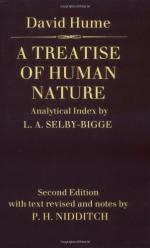
|
| Name: _________________________ | Period: ___________________ |
This test consists of 5 multiple choice questions, 5 short answer questions, and 10 short essay questions.
Multiple Choice Questions
1. What does Hume say is the only thing that can make uncaused choices?
(a) Free will.
(b) Mass society.
(c) There is nothing.
(d) The soul.
2. What does Hume say is the chief exercise of the memory?
(a) To confound critics.
(b) To ignite the imagination.
(c) To find the essence of an idea.
(d) To put simple ideas in order.
3. Which of the following best fits Hume's idea of perception?
(a) We all shape our own reality.
(b) No objects are real if we can see them.
(c) All objects are mere perceptions and have no reality.
(d) What we see is our reality.
4. What does Hume say he will use to discuss passion instead of physiology?
(a) Foreshadowing.
(b) Psychology.
(c) Symbolism.
(d) Experience.
5. What does Hume say is the only thing he finds when he looks inside himself?
(a) Perception.
(b) Fear.
(c) Love.
(d) Hate.
Short Answer Questions
1. What are the two ways in which Hume says one can exist?
2. From where does a human's substantive knowledge come?
3. Why does Hume think the immaterial soul does not exist?
4. What does Hume believe humans generate instead of observing causes?
5. What does Hume say will is instead of a power?
Short Essay Questions
1. What is the microscope principle?
2. What is the difference between responsive and productive passions?
3. What argument did Malezieu propose in terms of space and time?
4. Why does Hume think it is pointless to wonder about the external world?
5. What does Hume think are the two ways objects can exist?
6. Why does Hume think we love the rich and admire only people we know?
7. How does Hume divide the different kinds of philosophical relations?
8. What does Hume say are simple perceptions?
9. Define skepticism.
10. Why is resemblance so important in terms of relation?
|
This section contains 771 words (approx. 3 pages at 300 words per page) |

|




